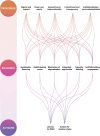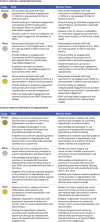WHO framework on meaningful engagement: A transformational approach to integrate lived experience in the noncommunicable disease and mental health agenda
- PMID: 38809940
- PMCID: PMC11135697
- DOI: 10.1371/journal.pgph.0002312
WHO framework on meaningful engagement: A transformational approach to integrate lived experience in the noncommunicable disease and mental health agenda
Abstract
As the global public health community continues to reflect and recover from the COVID-19 pandemic, noncommunicable diseases (NCDs), and mental health and neurological conditions remains one of the largest unmet gaps in progress towards meeting the Sustainable Development Goals (SDG). People living with these health conditions, particularly among those most marginalized, acutely understand the impact of these failures in global action and investment. Integrating lived experience into the NCD and mental health response can act as an accelerator for action. Through a participatory process to co-create the WHO Framework on Meaningful Engagement on NCDs, and Mental Health and Neurological Conditions, we conducted a mixed methods and semi-structured approach, including informal consultations, focus groups, in-depth interviews, online surveys, and a short film series, that captured the perspectives of 700 individuals from 111 countries, including 386 individuals with lived experience. Working alongside lived experience communities and other relevant stakeholders, we have established and co-created a set of principles, enablers and actions for operationalizing meaningful engagement, related to dignity and respect, power and equity, inclusivity and intersectionality, commitment and transparency, and institutionalization and contextualization. People with lived experience have a right to be equitably included in all levels of policy-setting, design and implementation of programs, and to have a central role in reforming and reorienting the structures and systems intended to address the complex multifactorial challenges that they face. WHO is committed to leveraging its role in global health to further operationalize meaningful engagement within WHO and its Member States.
Copyright: © 2024 Fisher et al. This is an open access article distributed under the terms of the Creative Commons Attribution License, which permits unrestricted use, distribution, and reproduction in any medium, provided the original author and source are credited.
Conflict of interest statement
The authors have declared that no competing interests exist.
Figures
Similar articles
-
Equalising power imbalances or a trail of broken promises? A qualitative study on engaging people with diverse lived experience of marginalisation in food policymaking in Australia.BMC Public Health. 2025 Feb 14;25(1):613. doi: 10.1186/s12889-025-21733-4. BMC Public Health. 2025. PMID: 39953486 Free PMC article.
-
Intersecting factors of disadvantage and discrimination and their effect on daily life during the coronavirus pandemic: the CICADA-ME mixed-methods study.Health Soc Care Deliv Res. 2025 Feb;13(2):1-185. doi: 10.3310/KYTF4381. Health Soc Care Deliv Res. 2025. PMID: 39949202
-
Exploring the value of community engagement activities within a participatory action research study to improve care for people affected by skin neglected tropical diseases in Liberia.Res Involv Engagem. 2025 Mar 24;11(1):27. doi: 10.1186/s40900-025-00695-2. Res Involv Engagem. 2025. PMID: 40128906 Free PMC article.
-
The Bidirectional Engagement and Equity (BEE) Research Framework to Guide Community-Academic Partnerships: Developed From a Narrative Review and Diverse Stakeholder Perspectives.Health Expect. 2024 Aug;27(4):e14161. doi: 10.1111/hex.14161. Health Expect. 2024. PMID: 39087753 Free PMC article. Review.
-
Mobilizing the Power of Lived/Living Experiences to Improve Health Outcomes for all.Health Expect. 2025 Apr;28(2):e70212. doi: 10.1111/hex.70212. Health Expect. 2025. PMID: 40101202 Free PMC article.
Cited by
-
Methodological and reporting recommendations for clinical trials in Nutritional Psychiatry: Guidelines from the International Society for Nutritional Psychiatry Research.Br J Nutr. 2024 Dec 10:1-13. doi: 10.1017/S0007114524001946. Online ahead of print. Br J Nutr. 2024. PMID: 39654150 Free PMC article.
-
Meaningful engagement with people with lived experience: challenging, messy, and more vital than ever.BMJ. 2025 Jul 8;390:r1138. doi: 10.1136/bmj.r1138. BMJ. 2025. PMID: 40628452 Free PMC article.
-
Mediators of the Association Between Severity of Noncommunicable Diseases and Subjective Health-Related Quality of Life.Neuropsychopharmacol Rep. 2025 Sep;45(3):e70040. doi: 10.1002/npr2.70040. Neuropsychopharmacol Rep. 2025. PMID: 40700022 Free PMC article.
-
Embracing the complexity of lived experiences in psychiatry research: Reflexivity, cultural sensitivity, and emergent design.World J Psychiatry. 2024 Dec 19;14(12):1793-1796. doi: 10.5498/wjp.v14.i12.1793. eCollection 2024 Dec 19. World J Psychiatry. 2024. PMID: 39704369 Free PMC article.
-
Equalising power imbalances or a trail of broken promises? A qualitative study on engaging people with diverse lived experience of marginalisation in food policymaking in Australia.BMC Public Health. 2025 Feb 14;25(1):613. doi: 10.1186/s12889-025-21733-4. BMC Public Health. 2025. PMID: 39953486 Free PMC article.
References
-
- World Health Organization. Global health estimates 2019: Deaths by cause, age, sex, by country and by region, 2000–2019. 2020. Available from: https://www.who.int/data/gho/data/themes/mortality-and-global-health-est...
-
- World Health Organization. World mental health report: Transforming mental health for all. 2022. Available from: https://www.who.int/publications/i/item/9789240049338
-
- World Health Organization. World health statistics 2023: monitoring health for the SDGs, Sustainable Development Goals. 2023. Available from: https://www.who.int/publications/i/item/9789240074323
-
- World Health Organization. Fact sheet–Suicide. 2021. Available from: https://www.who.int/news-room/fact-sheets/detail/suicide.
Grants and funding
LinkOut - more resources
Full Text Sources
Research Materials



